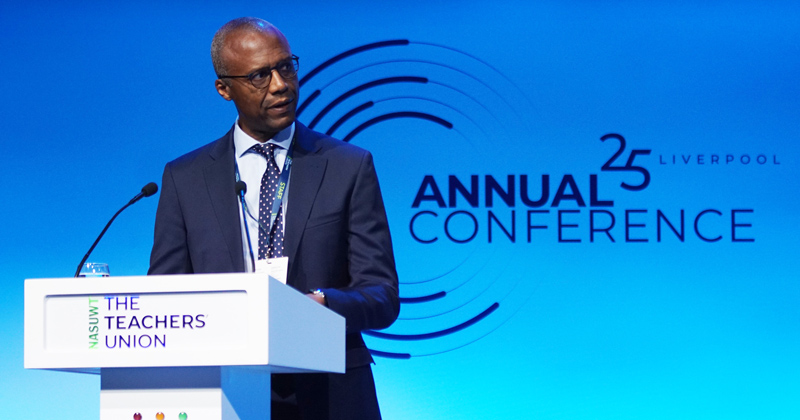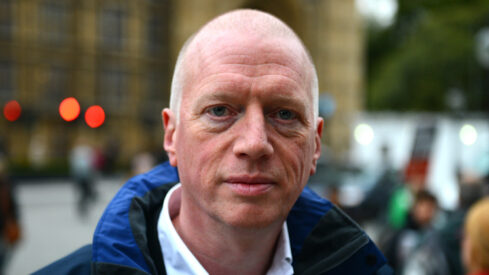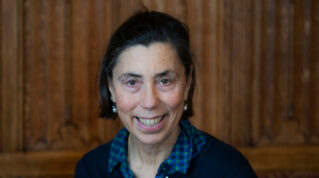The new head of the NASUWT has ruled out merging with another union “for now”, insisted his lack of teaching experience won’t hamper him in his role and said action to better engage members is needed after he was elected on a turnout of just 4.7 per cent.
Matt Wrack was elected as general secretary of England’s second-largest education union last week. The former Fire Brigades Union leader beat challenger Neil Butler with 5,249 to Butler’s 3,126.
Only 8,441 of 178,306 eligible members took part.
Speaking to Schools Week, Wrack pointed out general secretary election turnout was often low, but “equally, we can’t be happy with that 4.7 per cent”.
Wrack’s election has been controversial. The union initially announced he had been elected unopposed as its preferred candidate.
But it was forced to re-open nominations following a legal challenge from Butler, who was initially excluded from challenging Wrack, leading to its first contested election in 35 years.
As well as the requirement that unions use postal ballots, Wrack believes “one factor” in the low turnout was that “it did become a bit unpleasant”.
“NASUWT probably hasn’t had that level of external interest. It hasn’t had an election in 35 years. That’s probably a bit of a shock to the system. And all these people and newspapers intervening…may have just turned people off.”
‘I’m not complacent’
But he admits NASUWT also needs to “look at our own systems”.
The number of members eligible to take part in the election was around 80,000 lower than the total membership reported in last year’s annual return.
Some of these are retired and student members, but NASUWT said they also included those in arrears on their subscription fees and where the union believes it does not have an up-to-date address.
“Are our systems up to date and efficient and effective? And are we actively engaging with people properly to explain what their union membership means and why they need to participate in the union?” Wrack said.
While he said he was “relieved” the election was over, “I’m certainly not complacent about that at all. I think that’s disappointing, the turnout, and we need to address it.”
Background won’t hamper me in role, Wrack insists
Another controversial factor is Wrack’s background.
Originally from Manchester, Wrack worked as a firefighter in east London until his election to lead the FBU in 2005. He was ousted in an election in January.
He says he wasn’t ready to retire after this “blow”, and friends flagged that NASUWT was inviting applications for general secretary.
Does he think his lack of teaching experience will hamper his ability to do the role?
“No, I don’t,” he says.
He points out the union’s executive is made up of teachers, who are in a “very good place to assess what is needed by NASUWT at the present time.
“I understand the concerns about not being a teacher, and I understand that individual members may share that. In my travelling around the country and meeting teachers, I believe that I have won people over who had that doubt.
“I’m not claiming to have their level of expertise on classroom teaching experience, but I do have very, very significant experience as a trade unionist and a trade union leader in terms of negotiating.”
‘Speaking out firmly is not combative’
Wrack is also a prominent left-winger, and his selection by a union seen by many as more moderate than the National Education Union drew surprise in some quarters.
The Guardian quoted a Whitehall source as saying ministers had “expressed surprise that the teaching union was looking for someone with no teaching experience and an overly combative approach to industrial relations, taking the union away from the mainstream views of the school workforce”.
“I saw one comment about me that I was ‘overly combative’. I don’t think speaking out firmly on behalf of the people you represent [is overly combative],” Wrack says.
“I’m not rude to people I meet. I’m not rude to politicians or civil servants or such like, that’s just not the way you do business. But if we’ve got something to say, we won’t apologise about what we’ve got to say, and we’ll make that heard effectively.”
Merger ruled out ‘for now’
Wrack is also a close ally of NEU general secretary Daniel Kebede, and his election has raised fears among some in NASUWT that he may push the union towards a merger.
The NEU itself voted to “redouble” efforts to form a single education union at its conference this year. Kebede also told the conference he wanted to see it become a “union of a million members”. In response, NASUWT passed a motion calling for a public dismissal of their calls.

Wrack says it’s his job to implement that decision, but adds it’s “one thing to say you don’t want to merge. I think it’s far more important to deliver a long term, viable plan for a union. I And I think that’s a clear part of my task that I’ve been given.
“I think the general secretary has to make sure that we’re building membership, we’ve got secure finances, and so there’s a lot more to it than just rhetoric about whether we’re interested in merging or not.
“I always say to people, you need to think 10 years ahead, what’s education going to look like? What’s the union going to look like in 10 years time?”
Wrack also points to the “strong feeling in NASUWT about being a teacher-specific union”. The NEU admits support staff).
“I understand the logic of the way the NEU present themselves. Equally, In NASUWT, there’s a strong identity as teachers, and I think that’s one of the big motivating factors among activists in the union.”
So, is he ruling out a merger?
“I suppose, for now, I certainly am ruling it out. It’s probably…it’s a political, industrial question on a bigger scale for a different time perhaps.”
Concerns over workload and behaviour
Away from the politics of unions, Wrack’s in-tray is huge. He says he’s heard from members big issues with high workload and worsening behaviour.
“I think most members of the public and most parents would be shocked to see that teachers are physically injured in their workplace on the scale that they are,” he says.
Wrack’s concerns are borne out in national statistics. For example, the number of suspensions of pupils for assaulting an adult increased from 52,237 in 2022-23 to 62,897 in 2023-24.
The government’s own working lives of teachers survey found teachers worked on average 48.1 hours a week in 2024, with leaders working 56.6. The education secretary Bridget Phillipson recently asked the School Teachers’ Review Body to look at workload.
But “if we’re going to tackle workload, we have to operate on lots of different levels”, says Wrack.
“It’s not simply a question of going to the government and saying, you need to do something about workload.
“If we’re not organised in schools, with reps, with well-organised members, then there’s no way, if a headteacher, for example, is imposing excessive workload or making decisions that increase it, there’s no way of challenging that without an effective union on the ground.”
‘I don’t sabre-rattle for the sake of it’
The last three teacher pay awards have “eased the pressure on pay a bit”, but there is “frustration” that it is not fully-funded, which could lead to redundancies.
NASUWT’s approach to the pay award has been different to that of the NEU, which threatened a dispute.
Wrack says he doesn’t “believe in sabre-rattling for the sake of it”.
“I believe if you have to campaign for a ballot, you go out and you campaign, and you win the ballots, and you deliver the ballots, you deliver the yes votes, and hopefully, in the process of that, you resolve the thing before you get there.
“I’m not afraid of industrial action. But…you don’t play games with it. I think the position that we’re in in the NASUWT is a sensible one. I don’t see at this stage how you could take industrial action on this year’s pay. We’ll have to see what happens next year.”
‘I put forward my views forcefully if necessary’
Of the four major education unions, NASUWT was the most supportive of the Labour government during Dr Patrick Roach’s tenure as general secretary. The union was also close to the last Labour administration in the 1990s and 2000s.
The election of a veteran left-winger has prompted some concern engagement with government could become more strained.
Wrack points out he had “friendly relationships with a number of Tory ministers under the last governments.
“And my approach is to be as friendly and respectful as I can, while putting my views forcefully if necessary. And I think politicians should be big enough to be able to accept that.”

He also urges his critics to “judge me on my record. I don’t intend to be a general secretary sitting in his office all the time. I want to be out on the road, meeting teachers, learning from them, but also giving advice about how we make education better.
“It’s really a fascinating challenge, and I’m enthused about it. And over the next few months, hopefully people will begin to see that put into practice with some of the campaigns that we need to start engaging in.
“I suspect a lot of teachers wanted a change in government a year ago, but it’s not going to be an easy time for teachers or for education. And only if we organise as a union, carefully, effectively and as powerfully as we can, can we try and shift that debate in our favour.”













Your thoughts